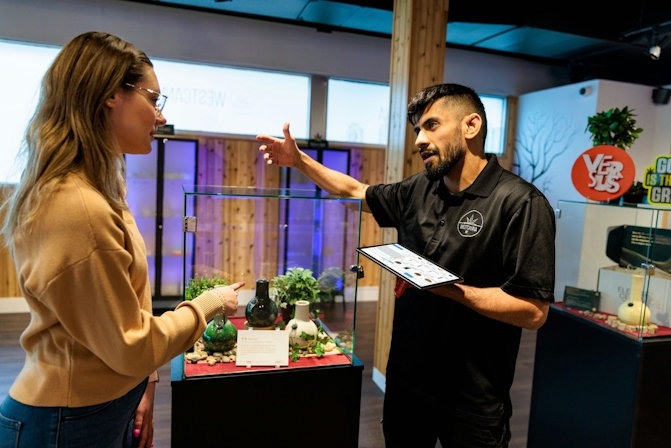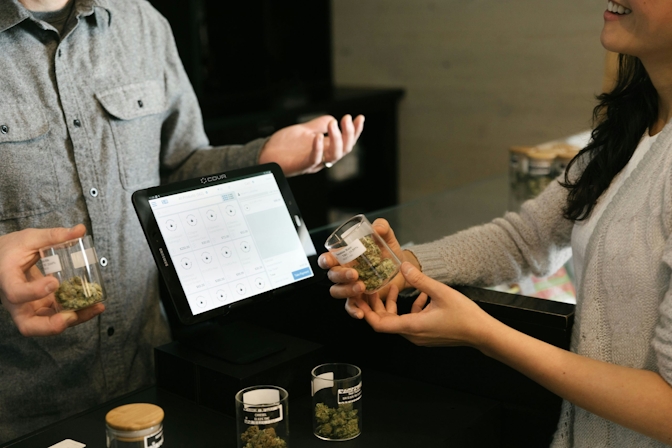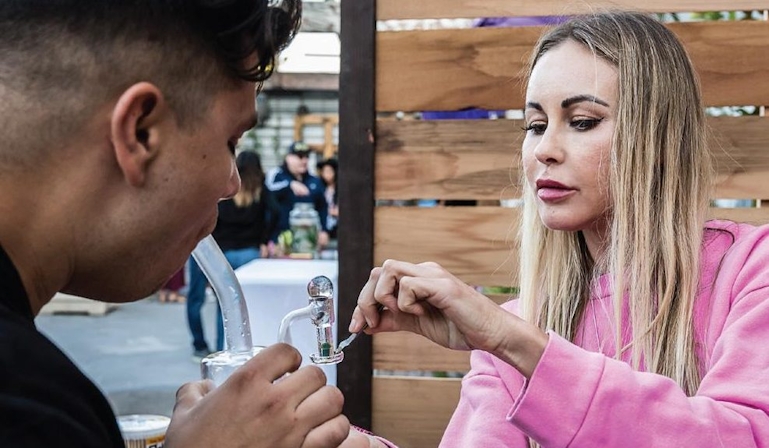
Photo Courtesy of ganjier
Cannabis Sommeliers: What It Takes to Be a Ganjier in 2026
Ganjiers vs. cannabis sommeliers: Understanding the difference and which path is right for you.
You don’t need lab tests to tell you when cannabis flower is good, but it helps to know what to look for. A cannabis sommelier can break down aroma, flavor, structure, and effect, and explain how those traits connect to the experience you’re likely to have.
Some work in dispensaries, others are cannabis judges for competitions, or educate medical cannabis patients. Some are certified. Many aren’t. But all of them bring a sharp eye, a trained nose, and a deep connection to the plant. As the cannabis industry continues to grow, so does the need for professionals who can guide others through it with clarity, nuance, and skill.
That’s where programs like Ganjier come in.
Key Takeaways

Cova
- Cannabis sommeliers know how to break down flower by scent, flavor, structure, and effect, and help others use that knowledge in real time.
- The Ganjier program turns that skillset into a formal credential, with training for both flower-focused sommeliers and product specialists.
- Both roles are helping raise the bar across the industry, from dispensary floors to cultivation sites to consumer education.
- The certification covers terpene science, cannabis terminology, effects-based evaluation, and real-world service skills.
- In 2025, Ganjier salaries in the U.S. range from $45K to $70K, with Canadian salaries slightly lower, but many move into consulting or freelance roles.
- For people looking to build credibility in cannabis, from budtenders and educators to entrepreneurs, it’s one of the clearest paths to leveling up.
What Is a Cannabis Sommelier?

Cova
Cannabis sommeliers do more than sniff jars and talk terpenes. The best ones can break down a flower’s qualities, explain how those traits translate into effect, and help others find something that works for them, not just what sounds trendy.
Some are certified. Others are self-taught after years in cultivation, retail, or working directly with medical patients. But all of them rely on a mix of sensory training, plant knowledge, and the ability to translate that into plain language for people who need guidance.
From judging competitions to recommending strains for chronic relief, cannabis sommeliers play a growing role in shaping how people understand and use the plant. Their ability to read flower and people makes them increasingly valuable as the industry matures.
Ganjier vs. Cannabis Sommelier

Photo Courtesy of ganjier
A Certified Ganjier is a cannabis sommelier, but not every cannabis sommelier is a Ganjier.
The term “cannabis sommelier” is widely used across the industry to describe people with advanced cannabis expertise, especially those working in flower-focused education, product curation, or sensory analysis. Some cannabis sommeliers gain this knowledge through hands-on work and long-term experience in the cannabis industry.
By contrast, a Ganjier completes a branded, structured certification program that teaches students how to assess cannabis through a formalized framework. Offered by The Ganjier, this certification covers everything from cannabis history and science to terpene expression and psychotropic effect prediction.
Both roles bring value to the industry. Whether they’ve trained through formal coursework or years of hands-on work, cannabis sommeliers and Ganjiers help consumers navigate the evolving cannabis landscape by imparting invaluable practical knowledge that improves education, product experience, and safe use.
What Is the Ganjier Certification Program?

Photo Courtesy of ganjier
The Ganjier Certification Pathway offers two options: the Certified Ganjier (Cannabis Sommelier) and the Ganjier Product Specialist. Both aim to train cannabis experts, but they focus on different areas of the consumer experience.
The idea was to create a training path that could evolve with the industry and make sense across different regions.
“We only know so much, and we have to be able to refine the knowledge as it changes,” Jodrey explains. “The creators of the program look at the picture from multiple different perspectives. What we’re trying to do is give you a common set of ideas that can be translated across the world.”
Certified Ganjier (Cannabis Sommelier)
The Certified Ganjier program is a hybrid training that combines online coursework with immersive in-person instruction in Humboldt, California. It’s a comprehensive program designed for people who want to master the sensory, scientific, and cultural aspects of cannabis quality and consumer guidance.
The course starts online, with material developed by members of the Ganjier Council. Over ten courses, you’ll cover cannabis history, cultivation, classification, terpene and cannabinoid science, and customer service protocols. From there, students attend two days of in-person training in Humboldt, CA. There, the focus is hands-on cannabis assessment using the Systematic Assessment Protocol (SAP), along with guided tastings and service role-play exercises. Ganjiers learn how to identify trichome quality with a jeweler’s loupe, train their palate for terpene nuance, and connect flower traits to real-world physical effects and psychoactive effects.
Kevin Jodrey, founder of the Ganjier program, says Humboldt was intentional. “It gives people the opportunity to experience the story of Humboldt and understand how the industry got its start. It allows them to meet craft farmers and see the beginning of the place that most people never have. You’re in the industry, but you don’t know the roots.”
You’ll also get hands-on practice with the Customer Interaction Protocol (CIP), which helps you learn how to talk with consumers in a way that meets their needs, whether they’re new to cannabis or looking for something specific. And instead of just staying in a classroom, the program takes you out to a local legacy farm, where you’ll meet longtime Humboldt growers, hear their stories, and try their craft cannabis flower.
Jodrey also emphasizes the value of learning directly from instructors. “The instructors are there in person, creating more familiarity and comfort, providing the environment for people to learn successfully. It shows that the instructors are engaging with the information rather than just teaching an online course.”
To become certified, you’ll need to pass three final exams:
- A written exam based on the online modules
- A service exam where you demonstrate customer guidance skills
- A blind product assessment using the SAP, where accuracy across all criteria is required
The full certification typically takes several months to complete and is intentionally small-scale. Each in-person training is limited to 20 students to ensure direct time with Ganjier instructors.
How Ganjiers Assess Cannabis Quality: The SAP
The Systematic Assessment Protocol (SAP) is Ganjier’s method for evaluating cannabis through real-world product experience, not just lab data. It focuses on four categories:
- Appearance: Visual grading using a jeweler’s loupe to assess trichomes, trim, and maturity.
- Aroma: Judged by intensity, complexity, and uniqueness.
- Flavor: Includes dry pull, smoothness, and longevity.
- Experience: Records physical and mental effects, plus an optional enjoyment score.
Each section is scored, with a final rating generated on a 100-point scale. Ganjiers can also create a condensed “Report Card” to summarize the breakdown and share with others.
Ganjier Product Specialist
This track gives a practical overview of every major product format, from flower and pre-rolls to edibles, concentrates, and topicals. Product Specialists learn how each is made, stored, and used, plus how to evaluate and guide consumption effectively. Their training also explores aroma, flavor, and form factor comparisons, as well as techniques for enhancing consumer experience across various delivery methods.
The Ganjier Product Specialist certification is fully online and takes about 10 hours to complete. Since there’s no in-person training, this option is well-suited for dispensary staff, marketers, and sales professionals looking to enhance their cannabis knowledge and speak with greater confidence, all without the need for travel.
Is Certification Worth It?

Photo Courtesy of ganjier
For industry professionals serious about cannabis, Ganjier offers structured training that can sharpen your skills, boost your credibility, and open up new opportunities.
Who It’s For:
- Budtenders and dispensary staff ready to level up into more specialized, better-paying roles
- Educators, consultants, and content creators looking to build authority and connect with broader audiences
- Executives and entrepreneurs wanting to design better products, speak confidently about cannabis, and boost credibility with partners and customers
- Legacy growers or enthusiasts who know the plant but want to close the gap on science, terminology, and formal training
- Cannabis newcomers looking to break into the field with a credential that sets them apart
What You’ll Gain:
- Industry-recognized cannabis education with structured, effects-based training
- Access to a broader professional network and cannabis community
- A deeper personal connection to the plant, backed by science and sensory evaluation
- The ability to guide others, or fine-tune your own consumption, with more confidence and clarity.
- Tools to break stigma, build confidence, and be seen as a trusted cannabis expert
What to Consider:
- The Product Specialist course runs around $300.
- Certified Ganjier is closer to $3,200 and requires travel for the in-person part in Humboldt.
- The sommelier track does take more time, but that’s part of the value.
- Most jobs don’t require certification, but having one can help you stand out.
- It’s a good fit whether you’ve been around cannabis for a while or you’re just starting to take it seriously.
Whether you’ve been around cannabis for years or are just beginning to see your future in the industry, Ganjier offers a path forward that is grounded in skill, community, and a genuine love for the plant.
Ganjier Salary in 2025: United States vs. Canada

Photo Courtesy of ganjier
There isn’t one set number for what a Ganjier or cannabis sommelier makes, but current estimates put the U.S. salary range somewhere between $45,000 and $70,000 a year. That can vary depending on the role; some work as dispensary managers or product consultants, while others focus on education, brand development, or quality control.
In Canada, similar roles tend to start a bit lower, averaging between $40,000 and $60,000 according to Glassdoor data. These numbers are based on limited reporting, so the actual range may shift as the industry grows and more certified professionals enter the space.
Many Ganjiers don’t stay in one lane. Freelance training, content creation, and product evaluation are common side routes, and in many cases, those lead to better pay and more flexibility than traditional roles. If you’re using the certification as a stepping stone into consulting or thought leadership, the earning potential goes beyond salary.
Final Thoughts

Photo Courtesy of ganjier
Cannabis is becoming more refined, and consumers are asking better questions. Whether you’re working behind the counter or consulting behind the scenes, having the tools to evaluate cannabis quality, understand effects, and educate others about different cannabis products is more important than ever.
Pursuing a path as a cannabis sommelier, through experience, certification, or both, is one way to contribute meaningfully to the industry and help shape its future. Programs like the Ganjier certification offer structured, respected ways to sharpen your skills, build a deep understanding of cannabis, and connect with the culture and community around it.
If you’re looking to become a cannabis expert, start with curiosity and continue with education, practice, and a commitment to guiding others safely and effectively.
Herb Recommended Products:
READ MORE










